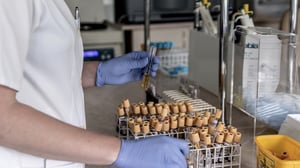
7 Advantages of Monoclonal Antibodies Over Polyclonal For Lab Research
Monoclonal antibodies (MAbs) have vast research applications in the diagnosis and treatment of cancer and diseases, as well as certain other immune-response therapies. While not universally preferred to polyclonal antibodies—which are much cheaper and more rapid to produce—there are several compelling advantages of monoclonal antibodies that make them highly valuable in lab research.
Research Advantages of Monoclonal Antibodies:
1. mAbs will be consistent.
Because they are homogenous and produced from a single immortal B cell clone, every MAbs sample will be consistent. Polyclonal antibody production, by contrast, has a natural batch-to-batch variability, as they’re produced in separate animals at separate times. This means they will sometimes require more than one control sample to reach a significant conclusion.
2. Monoclonal antibody production is infinitely scalable and renewable.
The B-cells that produce monoclonal antibodies ex-vitro are rendered immortal via fusion with myeloma cells (“Hybridoma” technology that won Georges Köhler and César Milstein the Nobel Prize in 1984). Once a suitable hybridoma is produced, the generation can continue indefinitely. With polyclonal antibodies, however, you’re limited to the lifespans of the host animals (often requiring the immunization of multiple hosts against the same antigen for a suitable supply).
3. Purity and concentration are much higher.
The homogeneity of polyclonal antibodies drawn from a single immortal sample is of enormous use if high-concentrations and purity are critical. Polyclonal antibodies hold a greater risk of cross-reactivity since they bind to multiple epitopes (unless they’ve been affinity-purified to minimize reactivity). With a monoclonal sample, you won’t need to concern yourself with checking cross-reactive immunogen sequences ahead of time to prevent false positives in diagnostics.
4. mAbs are more sensitive in assays.
High specificity makes monoclonal antibodies highly sensitive to small changes in salt concentration, pH, and—most importantly—quantification of protein levels. They exhibit very low background noise. MAbs are widely preferred in diagnostic assays for their speed, sensitivity, and specificity.
5. They’re ideal for on-demand antibody production.
With a single, immortal source hybridoma, monoclonal antibodies can truly be produced on demand. The advantage of using monoclonal antibodies, in this case, is that you won’t need to maintain a collection of host animals (or source new ones for a separate experiment down the line).
6. Useful for targeting a single, specified epitope of an antigen.
If your lab research is focused around a very specific interaction on a designated epitope, polyclonal antibodies run the risk of creating false positives and other undesired reactions. Use a monoclonal antibody source to elicit only the specified interaction.
7. Antigens and immunogens don’t need to be pure.
Again, due to the specificity of the monoclonal antibody’s interactions with only one epitope, you do not need to take additional measures to ensure the extreme purity of the antigen or immunogen. Overlooking this with a polyclonal sample could create unpredictable cross-reactions.
Monoclonal antibodies are reliable, but what about your antibody resource?
No matter whether you’re using monoclonal, polyclonal, or recombinant antibodies in your research, the supply can only be as reliable as the supplier. Numerous brands produce murine mAbs, but preferred monoclonal antibody manufacturers can provide you with the highest quality and purest samples year-in- and year-out. ImmunoDX has been servicing labs in need of human-made proteins, antibodies, antigens, and diagnostic assays since 1993, according to our clients’ precise specifications.
There are many advantages of monoclonal antibodies in the study and treatment of cancer. They are valued for their high concentration, purity, and ability to target and attach specifically to designated cancer cell epitopes. We understand that research on cancer and immunodiagnostics is serious work. Researchers trust ImmunoDX to take our products just as seriously and always provide the best possible monoclonal antibody resources for scalable, repeatable results.



